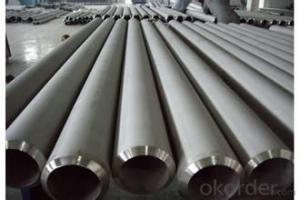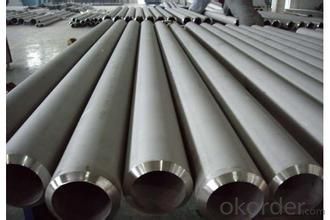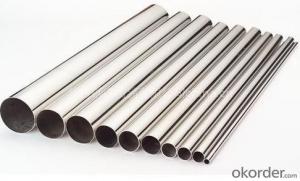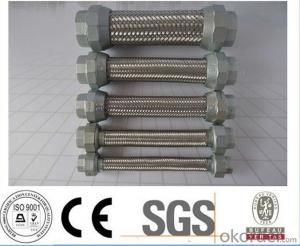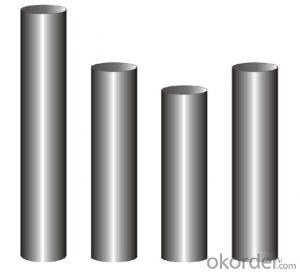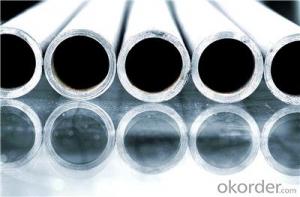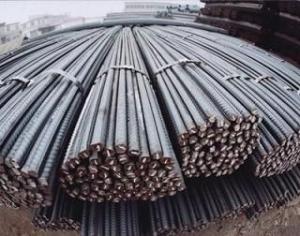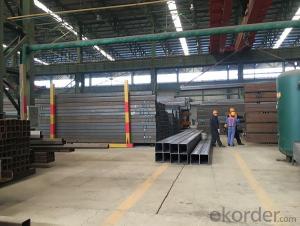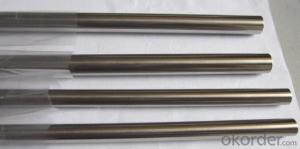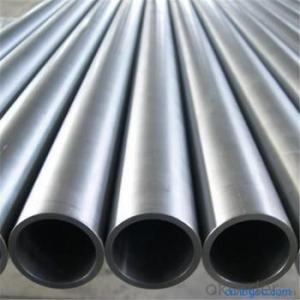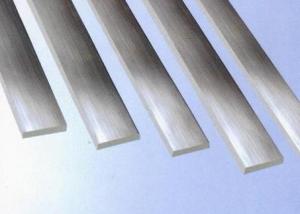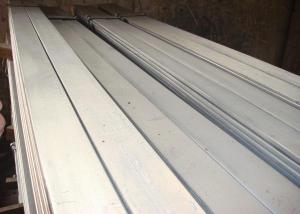Welding of duplex stainless steel pipe with good performance
- Loading Port:
- China main port
- Payment Terms:
- TT OR LC
- Min Order Qty:
- 20 m.t.
- Supply Capability:
- 4000 m.t./month
OKorder Service Pledge
OKorder Financial Service
You Might Also Like
Detail infomation
Standards: ASTM/ASME A789/SA789, A790/SA790,A450,A530
Material: UNS S31803(Cr22Ni5Mo3/1.4462)/2205,UNS S32750(1.4410),UNS S31500(Cr18NiMo3Si2),
UNS32760(1.4501)
Chemical Composition
Grade | C max | Si max | Mn max | P max | S max | Cr | Ni | Mo | N |
UNS S32750 | 0.030 | 0.8 | 1.2 | 0.030 | 0.015 | 24.0-26.0 | 6.0-8.0 | 3.0-5.0 | 0.24-0.32 |
UNS S31803 | 0.030 | 1.0 | 2.0 | 0.020 | 0.020 | 21.0-23.0 | 4.5-6.5 | 2.5-3.5 | 0.08-0.20 |
UNS S31500 | 0.030 | 1.0 | 1.2-2.0 | 0.030 | 0.030 | 18.0-19.0 | 4.5-5.5 | 2.5-3.5 | 0.05-0.10 |
Physical Properties
Grade | Y.S.MPa min | T.S.Mpa min | Elongation % | Hardness HRC |
UNS S32750 | 550 | 800 | 15 | 20 |
UNS S31803 | 450 | 620 | 25 | 20 |
UNS S31500 | 440 | 630 | 30 | 20 |
Supplementary Testing :
we also carry out on the manufactured products supplementary testing.
Radiography Testing |
Macro Testing |
Liquid Penetrate testing |
- Q: Can stainless steel pipes be used for gas transportation?
- Indeed, gas transportation can indeed make use of stainless steel pipes. Stainless steel, known for its resistance to corrosion, possesses the ability to endure high-pressure circumstances. This characteristic makes it suitable for the conveyance of diverse gases such as natural gas, propane, and hydrogen. The strength, durability, and ability to withstand extreme temperatures exhibited by stainless steel pipes render them an unquestionably dependable choice for gas transportation. Moreover, the non-reactive nature of stainless steel guarantees the preservation of gas integrity and reduces the likelihood of contamination. All in all, the gas industry extensively employs stainless steel pipes due to their reliable nature, safety, and prolonged lifespan.
- Q: Can stainless steel pipes be used for oil refineries?
- Yes, stainless steel pipes can be used for oil refineries. Stainless steel is a highly durable and corrosion-resistant material, making it suitable for handling various fluids and chemicals, including those found in oil refineries. The high strength and resistance to high temperatures and pressure of stainless steel pipes make them ideal for transporting and processing crude oil, refined petroleum products, and other hydrocarbons in the refining industry. Additionally, stainless steel pipes offer excellent resistance to corrosion, which is crucial in environments where oil and various chemicals are present. This resistance helps prevent leakage and ensures the integrity of the piping system, contributing to the safety and efficiency of oil refinery operations.
- Q: What is the difference between seamless and precision stainless steel pipes?
- The main difference between seamless and precision stainless steel pipes lies in their manufacturing processes. Seamless stainless steel pipes are made by piercing a solid stainless steel billet, while precision stainless steel pipes are created by cold rolling and cold drawing processes. This results in seamless pipes having a smoother internal surface and higher dimensional accuracy, making them suitable for applications requiring high-pressure and corrosive environments. On the other hand, precision stainless steel pipes are commonly used in industries where tight tolerances and precise dimensions are crucial, such as automotive and aerospace sectors.
- Q: Can stainless steel pipes be hardened?
- Yes, stainless steel pipes can be hardened through a process called cold working. Cold working involves subjecting the stainless steel pipes to deformation at low temperatures, such as through rolling, drawing, or bending. This process increases the strength and hardness of the material while retaining its corrosion resistance. However, it is important to note that stainless steel pipes cannot be hardened through heat treatment like carbon steels, as they already have a high level of hardness due to their composition.
- Q: Can stainless steel pipes be used for drinking water supply?
- Yes, stainless steel pipes can be used for drinking water supply. Stainless steel is resistant to corrosion, making it a safe and reliable material for transporting drinking water. It does not leach harmful chemicals into the water and is highly durable, making it suitable for long-term use in water supply systems.
- Q: Can stainless steel pipes be used for water treatment plants?
- Water treatment plants can indeed utilize stainless steel pipes. For water treatment purposes, stainless steel pipes offer numerous advantages. Firstly, their resistance to corrosion is highly beneficial in environments where pipes constantly come into contact with water and chemicals. This resistance ensures that the pipes remain durable and long-lasting, thereby reducing maintenance and replacement costs. Moreover, stainless steel pipes possess exceptional hygienic properties. Their non-porous nature prevents the absorption and retention of contaminants, ensuring that the water remains clean and uncontaminated throughout the treatment process. Consequently, stainless steel pipes are ideal for applications that require a high degree of cleanliness and purity, such as water treatment plants. Furthermore, stainless steel pipes are renowned for their strength and reliability. They can withstand high pressures and temperature fluctuations, thereby making them suitable for the demanding conditions frequently encountered in water treatment plants. Additionally, stainless steel pipes exhibit excellent mechanical properties, including high tensile strength and impact resistance, which further enhance their suitability for water treatment applications. In conclusion, stainless steel pipes are an excellent choice for water treatment plants due to their corrosion resistance, hygienic properties, and strength. They provide a durable, reliable, and sanitary solution for transporting water and chemicals during the treatment process.
- Q: What are the different types of stainless steel pipe supports?
- There are several different types of stainless steel pipe supports that are commonly used in various industries and applications. These include: 1. Adjustable pipe supports: These supports are designed to allow for easy adjustment of the pipe's position or height. They often feature a threaded rod or a telescoping design that can be extended or retracted to accommodate different pipe sizes or installation requirements. 2. Pipe hangers: These supports are used to suspend or hang pipes from overhead structures. They typically consist of a metal bracket or clamp that is attached to a beam or other structural element, and a hanging rod or strap that supports the weight of the pipe. 3. Pipe clamps: These supports are used to secure pipes to walls, floors, or other surfaces. They typically consist of a metal clamp that wraps around the pipe and is attached to the surface with screws or bolts. Pipe clamps can be adjustable or fixed, depending on the specific application. 4. Pipe saddles: These supports are used to cradle or support pipes on horizontal surfaces. They typically consist of a U-shaped metal bracket or saddle that is attached to the surface, and a cushioning material such as rubber or neoprene that helps to prevent damage to the pipe. 5. Pipe guides: These supports are used to guide or control the movement of pipes, particularly in applications where thermal expansion or contraction is a concern. They typically consist of a metal bracket or guide that is attached to a fixed structure, and a sliding or rolling element that allows the pipe to move while maintaining its alignment. Each type of stainless steel pipe support has its own specific advantages and is designed to meet different installation requirements. The choice of support will depend on factors such as the pipe material, size, weight, and the specific needs of the application.
- Q: How do stainless steel pipes compare to other materials like copper or PVC?
- Stainless steel pipes offer distinct advantages over materials like copper or PVC. Stainless steel pipes are highly durable, corrosion-resistant, and suitable for various applications, even in harsh environments. Unlike copper, stainless steel does not react with water or other substances, ensuring the purity of the transported fluids. Additionally, stainless steel pipes have a higher strength-to-weight ratio than PVC, making them more robust and long-lasting. While copper and PVC have their own merits, stainless steel pipes excel in terms of longevity, reliability, and overall performance.
- Q: What is the maximum allowable working pressure for stainless steel pipes?
- Several factors, including the grade of stainless steel, pipe size, and operating temperature, determine the maximum allowable working pressure for stainless steel pipes. Compared to other materials, stainless steel pipes generally have higher pressure ratings due to their exceptional resistance to corrosion. Standards and codes, such as ASME B31.3 and B31.1, typically determine the maximum allowable working pressure (MAWP). These codes provide guidelines for the fabrication, design, and installation of piping systems. For instance, ASME B31.3 offers tables and formulas that allow for the calculation of the maximum allowable working pressure based on the temperature, wall thickness, and material properties of the stainless steel pipe. Additionally, the code takes into account safety factors, corrosion allowances, and the specific service conditions. To determine the maximum allowable working pressure of the stainless steel pipe being used, it is crucial to consult the relevant standards and codes. Working pressures can vary significantly depending on factors such as pipe grade, dimensions, and intended application.
- Q: What are stainless steel pipes used for?
- Various industries widely use stainless steel pipes because of their exceptional durability, resistance to corrosion, and high strength. These pipes have extensive applications in plumbing systems, oil and gas industries, chemical processing plants, food and beverage processing, pharmaceutical industries, and automotive manufacturing, among others. Plumbing systems favor stainless steel pipes due to their ability to withstand high pressure and temperature, making them suitable for transporting water, gas, and other fluids. They are also commonly used in sewage and drainage systems because of their resistance to corrosion and chemical substances. In the oil and gas industries, stainless steel pipes are indispensable for transporting petroleum products, natural gas, and other fluids under high pressure and extreme temperatures. Their corrosion resistance properties make them essential in offshore and onshore drilling operations, refineries, and petrochemical plants, ensuring the safe and efficient transportation of these substances. Chemical processing plants rely on stainless steel pipes because of their resistance to chemical reactions and high temperatures. These pipes are used to transport various corrosive chemicals and gases without the risk of contamination or leakage. Additionally, they are utilized in heat exchangers, reactors, and other equipment that require corrosion-resistant materials. The food and beverage industry heavily relies on stainless steel pipes due to their hygiene and sanitary properties. These pipes are used for conveying various food products, such as milk, wine, beer, and other liquids, without altering their taste or quality. They are easy to clean, maintain, and sterilize, making them ideal for this industry. In the pharmaceutical sector, stainless steel pipes play a crucial role in conveying various drugs, chemicals, and sterile fluids. They meet the stringent requirements of the industry by ensuring product purity, preventing contamination, and offering resistance to corrosion and temperature extremes. Furthermore, stainless steel pipes are utilized in automotive manufacturing because of their structural strength and resistance to heat and corrosion. They are used in exhaust systems, fuel lines, and other components where durability and resistance to extreme conditions are necessary. In conclusion, stainless steel pipes are versatile and essential in numerous industries, providing the perfect combination of strength, durability, and corrosion resistance required for a wide range of applications.
Send your message to us
Welding of duplex stainless steel pipe with good performance
- Loading Port:
- China main port
- Payment Terms:
- TT OR LC
- Min Order Qty:
- 20 m.t.
- Supply Capability:
- 4000 m.t./month
OKorder Service Pledge
OKorder Financial Service
Similar products
Hot products
Hot Searches
Related keywords
